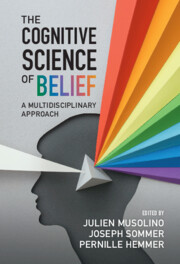Book contents
- The Cognitive Science of Belief
- The Cognitive Science of Belief
- Copyright page
- Contents
- Figures and Tables
- Contributors
- Chapter 1 Introduction
- Part I Understanding Belief
- Philosophical and Linguistic Approaches to Beliefs
- Models of Optimal Beliefs
- Chapter 5 How and Why Does Schematic Knowledge Affect Memory?
- Chapter 6 Probability, Belief, and the Richness of Cognition
- Implicit vs Explicit Beliefs
- Evolutionary Psychology of Beliefs
- Part II Domains of Beliefs
- Part III Variation in Beliefs
- Index
- References
Chapter 5 - How and Why Does Schematic Knowledge Affect Memory?
from Models of Optimal Beliefs
Published online by Cambridge University Press: 03 November 2022
- The Cognitive Science of Belief
- The Cognitive Science of Belief
- Copyright page
- Contents
- Figures and Tables
- Contributors
- Chapter 1 Introduction
- Part I Understanding Belief
- Philosophical and Linguistic Approaches to Beliefs
- Models of Optimal Beliefs
- Chapter 5 How and Why Does Schematic Knowledge Affect Memory?
- Chapter 6 Probability, Belief, and the Richness of Cognition
- Implicit vs Explicit Beliefs
- Evolutionary Psychology of Beliefs
- Part II Domains of Beliefs
- Part III Variation in Beliefs
- Index
- References
Summary
Beliefs have been studied across disciplines using a variety of approaches. In the human memory literature, expectations and beliefs drawn from prior knowledge are characterized and studied as schematic knowledge. In this chapter, we will discuss the role schematic knowledge plays in guiding the formation and retrieval of memories. A central focus will be placed upon understanding why retrieved memories are biased toward prior beliefs or schematic knowledge. Through a review of computational models and empirical findings, this chapter will convey that even though prior beliefs generate memory biases, these memory biases ultimately maximize the average memory accuracy – giving rise to optimal behavior. In the last section of the chapter, I will connect these modeling frameworks to more recent empirical results on the role of schematic knowledge, identifying potential future directions for updating the models and venues for conducting new experiments.
- Type
- Chapter
- Information
- The Cognitive Science of BeliefA Multidisciplinary Approach, pp. 113 - 134Publisher: Cambridge University PressPrint publication year: 2022
References
- 3
- Cited by

